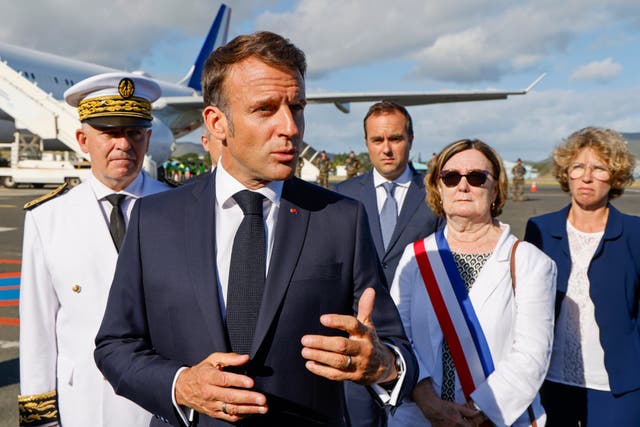Macron says he will not force through voting reform in troubled New Caledonia
The French president called for a minute’s silence for the six people killed in shootings during the violence in the archipelago.

French President Emmanuel Macron said on a visit to riot-hit New Caledonia on Thursday that he will not force through a contested voting reform that has sparked deadly unrest in the French Pacific territory.
He said he wants to leave time for local leaders to come up with an alternate agreement for the archipelago’s future.
Speaking after a day of meetings with leaders on both sides of New Caledonia’s bitter divide between indigenous Kanaks who want independence and pro-Paris leaders who do not, Mr Macron laid out a roadmap that he said could lead to another referendum on the archipelago.
Three earlier referendums between 2018 and 2021 produced “no” votes against independence.

“I have pledged that this reform won’t be pushed through with force today in the current context and that we are giving ourselves a few weeks to allow for calm, the resumption of dialogue, with a view to a global agreement,” he said.
Mr Macron has pushed for the removal of protesters’ barricades during his visit said police sent in to help battle deadly unrest in the French Pacific archipelago “will stay as long as necessary”.
His comments came even as security services back in France were focusing in coming weeks on safeguarding the Paris Olympics.
By cancelling his previously announced schedule to fly across the globe from Paris to New Caledonia, Mr Macron brought the weight of his office to bear on the crisis, which has left six dead and a trail of destruction.
Pro-independence Kanak leaders, who a week earlier declined Mr Macron’s offer of talks by video, joined a meeting the French leader hosted in the capital, Noumea, with rival pro-Paris leaders who want New Caledonia, which became French in 1853 under Emperor Napoleon III, to remain part of France.
Mr Macron first called for a minute’s silence for the six people killed in shootings during the violence, including two gendarmes. He then urged local leaders to use their clout to help restore order.

“Everyone has a responsibility to really call for the lifting of the barricades, the cessation of all forms of attack, not simply for calm,” he said.
Barricades made of charred vehicles and other debris had turned some parts of Noumea into no-go zones and made travelling around perilous, including for the sick requiring medical treatment and for families concerned about where to find food and water after shops were pillaged and torched.
French authorities said more than 280 people had been arrested since violence first flared on May 13 as the French legislature in Paris debated contested changes to New Caledonia voter lists.
The unrest continued to simmer as Mr Macron jetted in, despite a 6pm to 6am curfew and more than 1,000 reinforcements for the archipelago’s police and gendarmes, now 3,000 strong.
“I will be very clear here. These forces will remain as long as necessary. Even during the Olympic Games and Paralympics,” which open in Paris on July 26, Mr Macron said.

Later, at Noumea’s central police station, Mr Macron thanked officers for facing what he described as “an absolutely unprecedented insurrection movement”.
“No-one saw it coming with this level of organisation and violence,” he said. “You did your duty. And I thank you.”
The violence is the severest in New Caledonia since the 1980s, the last time France imposed a state of emergency on the archipelago of 270,000 people and decades of tensions over the issue of independence between Kanaks and the descendants of colonists and other settlers.

This week, military flights evacuated stranded tourists.
“We will discuss questions of economic reconstruction, support and rapid response, and the most delicate political questions, as we talk about the future of New Caledonia,” Mr Macron said.
“By the end of the day, decisions will be taken and announcements will be made.”

Both French houses of parliament in Paris have approved the proposed reform but it would require a revision of France’s constitution to take effect.
It would enlarge voter numbers in provincial elections for New Caledonia’s legislature and government, adding about 25,000 voters, including people who have been residents of the archipelago for at least 10 years and others born there.

Supporters say the proposed overhaul is democratically important for people with roots in New Caledonia who cannot currently vote for local representatives.





